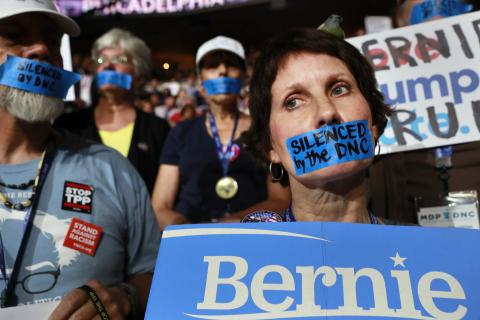The DNC knows it has a populism problem. The Democratic Party is more divided than ever in the wake of the 2016 election. But does their new platform go far enough to reassure American voters that they’re trustworthy and that they’ve reinvented the party since the 2016 election?
Recent history indicates otherwise.
The election of Tom Perez as DNC Chair did little to alleviate concerns of progressives who thought a shakeup in party leadership could set the party’s course straight.
Of course, Perez did offer a concession by naming his primary opponent, Keith Ellison, as Deputy DNC Chair, but thus far it appears to be a symbolic gesture.
The DNC’s campaign strategy hasn’t changed since Hillary Clinton’s historic loss either.
Everyone now knows that the DNC’s quantity-over-quality, fear-based approach to organizing has done nothing to resonate with or establish any genuine connection to the American people.
It’s a big part of the reason why they’ve lost 1,000 legislative seats since 2008 and why Clinton lost too.
To quote a recent New York Times op-ed:
“No wonder many voters distrust institutions and the establishment. Their engagement with the party mostly consists of receiving fund-raising emails intended to enforce programmatic conformity while activating fear of and resentment toward the other party.”
Yet, somehow, in the most expensive congressional race to-date, John Ossoff’s special election campaign utilized a near carbon-copy of the Hillary Clinton/DNC approach: The endless fundraising emails and negative messaging, with no clear vision for a path forward.
No wonder the Democrats are 0-5 in special elections this year.
These actions, and others, have left many progressives wondering whether they should abandon ship. So of course the announcement of the DNC’s new platform earlier this week came as a welcome surprise. Maybe this is the change that everyone has been waiting for.
But are we really expected to believe that this new DNC platform represents a radical shift? Or is this simply a symbolic gesture, like the appointment of Keith Ellison to a made-up leadership position?
Can a party that rigged its own primary truly concede ground to the very activists it once sought to silence?
And is this new platform a concession to progressives or simply a page stolen from the progressive organizing book and reappropriated to fit into the DNC’s electoral strategy?
Given the precedent, I’m not optimistic that this platform represents any sort of radical shift toward true populism or a bending of will to progressive activists. And here’s why:
As long as people like Tom Perez are in control of the DNC, the Party is never going to truly change. The same people are still running the DNC as last year. The only difference is that Bernie Sanders has some influence.
But this is still Bill and Hillary Clinton’s Party, where 90s-style neoliberalism is in vogue and data reigns supreme.
How can you expect a group of people who have proven themselves to be corrupt and out-of-touch to change overnight?
The DNC’s organizing apparatus -- the consulting firms, lobbyists, and staffers who rake in millions of dollars from DNC campaigns and operations -- has too much on the line to concede any real control.
That’s why the party won’t outsource its funds to state chapters, local organizing groups, or firms outside of DC, and it’s why its leaders won’t support progressive candidates.
The party wants to control everything themselves because it’s a profitable model and it gives them power, even if that means losing elections.
This new platform doesn’t change any of that. So as long as the organizing strategy remains the same, and the leadership remains the same, how is a different platform going to change anything?
This is a wholly corrupted institution.
Over the past two years, since the presidential primaries began, the DNC has been embroiled in scandal after scandal, with no clear end in sight.
The ongoing class-action lawsuit against the DNC (for rigging their primary) doesn’t bode well for the party’s image or its attempted rebrand with this new platform -- especially not when their defense hinges on the argument of: “We’re a private corporation with no obligation to follow our own rules.”
And the whole thing just keeps getting weirder and worse, with a seemingly endless barrage of allegations against former DNC Chair Debbie Wasserman Schultz, including news last week that one of her staffers smashed the office hard drives and tried to flee the country because he was under indictment.
So yes, it seems nice on paper that the DNC is harkening back to Teddy Roosevelt’s days of trustbusting with this “populist” platform, but the fact of the matter is that this party hasn’t actually changed since 2016. It is still up to the same nefarious types of activities and heavy-handed campaign strategy that got them into this mess.
Party leaders have no intention of democratizing their electoral process or making amends for their corrupt practices. So why should anyone trust them? Their words still don’t align with their actions. No platform will change that.
If the definition of insanity is trying the same thing twice and expecting a different a result, then it is literally insane to trust the DNC until its leaders restructure its organizing strategy and get rid of the current leadership.
Only then will the party deserve a chance to gain back the confidence of the American people.
